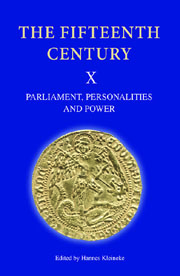Book contents
- Frontmatter
- Contents
- List of Illustrations
- Contributors
- Acknowledgements
- Preface
- Abbreviations
- The People and Parliament in Fifteenth-Century England
- ‘A Beest envenymed thorough … covetize’: an Imposter Pilgrim and the Disputed Descent of the Manor of Dodford, 1306-1481
- Henry Inglose: A Hard Man to Please
- London Merchants and the Borromei Bank in the 1430s: the Role of Local Credit Networks
- ‘Mischieviously Slewen’: John, Lord Scrope, the Dukes of Norfolk and Suffolk, and the Murder of Henry Howard in 1446
- A Fifteenth-Century Medicus Politicus: John Somerset, Physician to Henry VI
- ‘Domine Salvum Fac Regem’: The Origin of ‘God Save the King’ in the Reign of Henry VI
- ‘Monuments of Honour’: Clerks, Histories and Heroes in the London Livery Companies
- The East Anglian Parliamentary Elections of 1461
- Changing Perceptions of the Soldier in Late Medieval England
- Thomas More, the London Charterhouse and Richard III
- Index
- Tabula Gratulatoria
‘Domine Salvum Fac Regem’: The Origin of ‘God Save the King’ in the Reign of Henry VI
Published online by Cambridge University Press: 05 February 2013
- Frontmatter
- Contents
- List of Illustrations
- Contributors
- Acknowledgements
- Preface
- Abbreviations
- The People and Parliament in Fifteenth-Century England
- ‘A Beest envenymed thorough … covetize’: an Imposter Pilgrim and the Disputed Descent of the Manor of Dodford, 1306-1481
- Henry Inglose: A Hard Man to Please
- London Merchants and the Borromei Bank in the 1430s: the Role of Local Credit Networks
- ‘Mischieviously Slewen’: John, Lord Scrope, the Dukes of Norfolk and Suffolk, and the Murder of Henry Howard in 1446
- A Fifteenth-Century Medicus Politicus: John Somerset, Physician to Henry VI
- ‘Domine Salvum Fac Regem’: The Origin of ‘God Save the King’ in the Reign of Henry VI
- ‘Monuments of Honour’: Clerks, Histories and Heroes in the London Livery Companies
- The East Anglian Parliamentary Elections of 1461
- Changing Perceptions of the Soldier in Late Medieval England
- Thomas More, the London Charterhouse and Richard III
- Index
- Tabula Gratulatoria
Summary
Domine salvum fac regem: et exaudi nos in die qua invocaverimus te.
‘God save the king’ is by far the best known of all royal acclamations in the English language. The origins of the phrase lie in the first part of the tenth verse of psalm 19 in the Vulgate text. It first appeared in Latin as a royal motto in the reign of Henry VI, was adopted by his successors and, after its translation into English, was inserted at the foot of royal proclamations, incorporated into the coronation service and eventually reached its apotheosis as the refrain of the national anthem. This paper aims to investigate certain aspects of the origin and development of the use of the phrase in England through a discussion of its adoption as a motto and its employment in ritual, liturgy and royal propaganda.
Research into the early use of the phrase ‘God save the king’ has been largely limited to its place in the lyrics of the English national anthem, the oldest of all national anthems. The genesis of the anthem, both words and music, remain obscure. The earliest known source is a printed volume of songs published in 1744 under the title ‘Harmonia Anglicana’, though the words ‘God save the king’ set to the first four notes of a catch by Henry Purcell (?1658–1695), ‘Since the duke is returned’, suggest a longer history. Unquestionably the acclamation ‘God save the king’ was well known long before the eighteenth century. There were two main reasons for the widespread currency of the phrase in the sixteenth and seventeenth centuries.
- Type
- Chapter
- Information
- The Fifteenth Century XParliament, Personalities and Power - Papers Presented to Linda S. Clark, pp. 121 - 142Publisher: Boydell & BrewerPrint publication year: 2011

